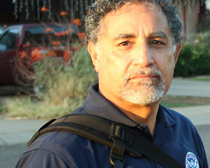Special Agent in Charge George C. Venizelos of the Philadelphia Division of the FBI announced today that Stacy A. Irving, Senior Director of Crime Prevention Services for the Center City District and Chairperson of the Philadelphia Crime Prevention Council, is this year’s recipient of the FBI Director’s Community Leadership Award for the Philadelphia Division.
Ms. Irving was presented with a certificate this past Thursday in the FBI offices in Philadelphia, and a formal ceremony will be held at FBI Headquarters on Friday, March 16, 2012, during which the FBI Director will personally present each of the recipients with their award.
Since 1990, the FBI has publicly recognized and honored the achievements of individuals and organizations for their continued efforts in combating crime, terrorism, drugs and violence in America with the FBI Director’s Community Leadership Award. Each year, one individual or organization in each of the FBI’s 56 field offices is selected whose achievements in the terrorism, crime, drug, gang, and/or violence prevention and education field have had exemplary impact on the community.
With more than 30 years of experience working with neighborhood and downtown business communities, Ms. Irving is internationally recognized for her unique crime prevention models, which combine crime reduction strategies, economic development, emergency preparedness and police, business and community partnerships.
Ms. Irving has been an active supporter of the FBI, working closely with both the Philadelphia Division and the FBI’s Community Relations Unit at FBI Headquarters for many years. She is a 1997 graduate of the FBI Philadelphia’s Citizens Academy Program, a co-founder and the current President of the FBI Philadelphia Citizens Academy Alumni Association, and a member of the Board of Directors and past Vice President of the FBI National Citizens Academy Alumni Association.
To further support the FBI and local law enforcement, Ms. Irving works closely with the FBI’s Violent Crimes Task Force and Counter Terrorism Squads on a variety of crime issues in the central business district. Over several years, she has helped coordinate the Annual Bank Robbery Prevention Summit with the Delaware Valley Financial Security Officers Group which is designed to assist law enforcement and financial institutions from throughout the region.
In 2010 and 2011 Ms. Irving helped coordinate two-part meeting between the FBI National and local Citizens Academy Alumni Associations and our office, along with representatives of more than 23 Muslim organizations from the region. These meetings provided an opportunity to bring together the Muslim community with federal, state and local law enforcement and human relations organizations, and to identify issues of concern, to facilitate mutual understanding, as well as to forge stronger partnerships.
Ms. Irving also serves as founder and Chairperson of the Philadelphia Crime Prevention Council, which is a forum for federal, state and local law enforcement working in partnership with corporate and private security to identify and facilitate crime prevention and emergency preparedness strategies. The Philadelphia Crime Prevention Council is celebrating its 14th year of successful public/private partnerships. Since September 11, 2001, Ms. Irving has dedicated a portion of every meeting to the FBI to provide counter-terrorism updates and to insure that the FBI has a strong working partnership with the private sector and local law enforcement.
Ms. Irving is the co-founder and administrator of the Alert Philadelphia emergency communications network in partnership with the Philadelphia Police Department. This critical communications tool was developed in response to the terrorist attacks on September 11, 2001 to enable law enforcement and emergency management to communicate with the private sector and each other in the event of an emergency. Alert Philadelphia is being used to provide real-time text based messages with critical information on homeland security, crime alerts, bank robberies, amber alerts, bomb threats, demonstrations, and appeals for information, among other vital notifications. The system is an excellent example of public/private partnerships, as well as an emergency management and crime fighting tool, and has been credited with aiding the Philadelphia Police Department with five arrests to date.
The Philadelphia Division of the FBI presents Ms. Stacy Irving with the 2011 Director’s Community Leadership Award for her selfless dedication to making Philadelphia a stronger and safer community through her crime prevention initiatives, law enforcement and private sector partnerships and her steadfast support on behalf of the FBI and its mission.









